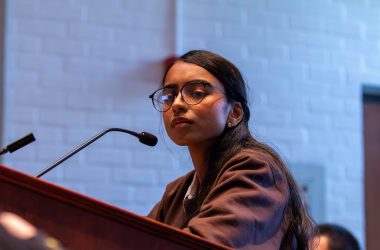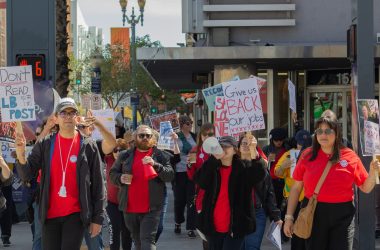Instead of packing bathing suits and souvenirs for her vacations, Marianne Guevara packs essentials such as medicine, diapers, menstrual pads, soap and toothpaste when preparing for her visits back to Venezuela.
Her family and friends ask her for these basic items because they cannot be easily purchased in Venezuela.
Since oil prices plummeted in the country, food and personal care items rose in price, leaving many store shelves empty. The people of Venezuela have been rising against its President Nicolas Maduro for over a year in response.
Maduro has been in power since April 2013, and although he’s known for following former President Hugo Chavez’s socialism practices, the interim president has been causing tremendous havoc throughout the country. Maduro has failed to use the country’s funds for food and medicine for the Venezuelan people. People have endured weeks without basic food staples and sometimes the need is such that they have to eat out of the trash.
For Guevara, a 19-year-old biomedical engineering student at Cal State Long Beach with an international student visa, it’s not easy living in the United States while knowing her family lacks basic necessities.
Born in Maturin, Venezuela, Guevara came to the United States to get her degree in biomedical engineering, a career that isn’t offered in Venezuela. In addition, she said that her career would not be as valuable in Venezuela as it can be here.
During his presidency, Chavez fired over 10,000 employees from Venezuela’s oil giant, Petroleos de Venezuela, S.A. and replaced them with employees who supported his socialist practices.
Guevara’s parents worked for PDVSA, but they never fully supported Chavez’s socialism. In 2002, when it was made public who had voted against him, her mother and father became two of the 10,000 employees who were fired for opposing Chavez.
“My dad never found a job in Venezuela since then,” said Guevara. “He has worked in Peru, Argentina and Trinidad and Tobago, but he never found a job in Venezuela again.”
Protests against Maduro fill the streets daily. There have been more than 1,800 arrests since early April and about 37 people have died during battles with security forces, according to NBC News.
She adds that media coverage was never as accurate as it should have been. Soap operas and music videos would take up more air time than the news, she explained.
“We starve to death, the police kills us, we kill each other but the [government] doesn’t do anything,” Guevara said.
The economic crisis affects the entire country. But while the wealthy are still able to buy luxury goods, the middle and lower classes are facing struggles.
Guevara, aunt to a 1-year-old girl, has made sure to take large quantities of baby formula for her niece, since it’s a scarcity back in Venezuela.
She notes the differences between the availability of supplies from when she was a child, to today
“When I was little, my mom would buy a packet of diapers a week,” she said. “My niece’s mom started buying diapers of all sizes a year before my niece was born.”
But buying diapers more than once a week (and such in large quantities) is no longer possible.
Guevara said that mothers now must show the baby’s birth certificate and present an identification card. The final numbers on the identification card will determine what day of the week she is able to shop.
This identification card system was implemented to track those who stock up on groceries to then resell them illegally.
However, crossing off all items of the shopping list is not guaranteed.
The situation has gotten so bad that some Venezuelans cross into Colombia to buy food. Guevara says that, at times, the military will close the border between both countries, leaving many people without food.
Some Venezuelans call to impeach president Maduro, but Victor Rodriguez, Chicano and Latino Studies professor, says that would be “like shooting yourself in the foot,” because Maduro’s vice president, Tareck El Aissami, is more extremist than him.
“I don’t think the government is going to be overthrown,” he said. “But I think there’s some hot heads in the government that think ‘Our president has been too tolerant. Why don’t we arm our [police] officers, our army?’”
As much as she loves her home country, Guevara said she will stay in the United States and financially help her family after graduation.
“A wisdom tooth extraction is about 6000 bolivares, $15 equals 6000 bolivares” said Guevara, to illustrate how it would be more beneficial for her to send American currency to her family in Venezuela.
Regardless of the need for her area of expertise in her native country, Guevara thinks that the country’s economic situation would not allow her to exercise her skill set and land a job.
The 19-year-old said that she asked her parents why don’t they come to the United States and start a new life.
“I belong to Venezuela,” her father had said to her. “It’s easier for you to detach.”
Guevara said she feels some guilt for leaving her family in Venezuela while she lives comfortably in the United States.
She shared a few stories about her friends in Venezuela who have experienced being robbed during class, heard bombings outside their houses, faced the dangers of tear gas out in the streets and the obligatory need to be at home before dark in order to avoid kidnapping or theft.
She adds that the protests have always been present.
“Important dates like Independence Day, Indigenous people’s days and others have become days for protests,” she said.
Her mother never let her go out to the streets to protest, but Guevara remembers situations in which the National Guard shot protesters.
“Aren’t they here to protect us?” she said, as she reflected on the violence.
But regardless of what her country is facing, Guevara says she focuses on the beauty of Venezuela.
“I always tell [other people] that Venezuela is beautiful,” she said. “I talk about the beaches, deserts and waterfalls.”
Guevara wishes people would’ve reacted sooner about Chavez’s socialism ideas.
“I wish Chavez would’ve never won.”




